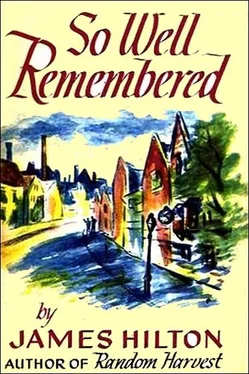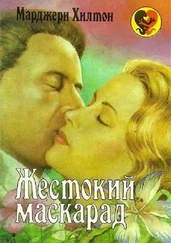She said after a pause: “Do you hate me, George?”
He shook his head. “I never did and I never could. I’m not much use at hating folks, to be frank. But I can fight ‘em when I have to… and I’d have to now, if you made me.”
“And you think you’d win?”
“I’m not so sure, but I’m not sure I’d lose, either. That’s why I say give him a chance. Give us all a chance this time.”
In the kitchen she prepared tea herself, not letting him do so, as if she were certain nothing had been changed (and practically nothing had). She began to cry a little while she moved about. George watched her unhappily, puzzled not so much by her behaviour as by his own, for he found himself less moved by her tears than by her simple act of tightening a tap that had been leaking into the sink for days. Nobody could do things so deftly, quickly, tidily, incontrovertibly. She had probably got her own way with Japs pretty much as she did with taps, George reflected whimsically; and then again he was touched by her next remark, clairvoyant in that old familiar blinding way of hers: “You think I’m acting, don’t you, George? And you think that means I’m not sincere?… You don’t understand that sometimes I mean things so much I HAVE to act?… You don’t understand that, because you NEVER mean things so much… Oh, George, you don’t know how terrible it is to be alive in this world!”
“Perhaps I do, Livia, perhaps I don’t feel it the way you do, but I know it, and I also know this—there’s not only terror—there’s hope —and love—”
“But they’re the most terrible of all—”
“Nay, nay, not how I see things.”
“But do you see ANYTHING? Anything to match love and hate? I love my son and I hate that girl—I’d kill her if I got the chance…”
“You would?”
“That shocks you, doesn’t it?”
“Nay… it doesn’t exactly do that. But it makes me think.”
“And you think it’s awful… yet all the other killing that’s going on —killing without hate—oh, THAT you can take for granted. Duty. Honour. Jeffrey did too—and with better brains than yours… What do you SEE, George? In the future, I mean? What chance is there? This humanity you do everything for—what do you see in it?”
George saw the greyness round the edges of the curtains; he looked at his watch, then crossed to the window and let in the summer dawn. Already it was staring the moon out of the sky. It seemed to him that the world, like Livia, was snarled with memories and desires, beauty and blackness and lies and truth and hope and despair; you might as well leave it alone unless you had a driving love for the thankless job of tackling it. But if you had that love, then you could go ahead. George saw the roofs across the street as they took form and substance, and knew that the love in his own heart was more than he could speak or even make a speech about—and least of all to Livia; but the thought of it, and the continual vision of it, had governed all he had ever done that seemed either weak or strong.
“Aye,” he said as he turned back to her. “I’ve often wondered that myself, but it doesn’t make any difference.” He came over and touched her shoulder with a kindliness induced by his own thoughts rather than by any more personal emotion. “Drink up, Livia—we’ll have to hurry if you want to catch the five-ten. And no more arguments, because we’ll not change each other, I reckon, from now till doomsday…”
First published by Little, Brown & Co., Boston, 1945










